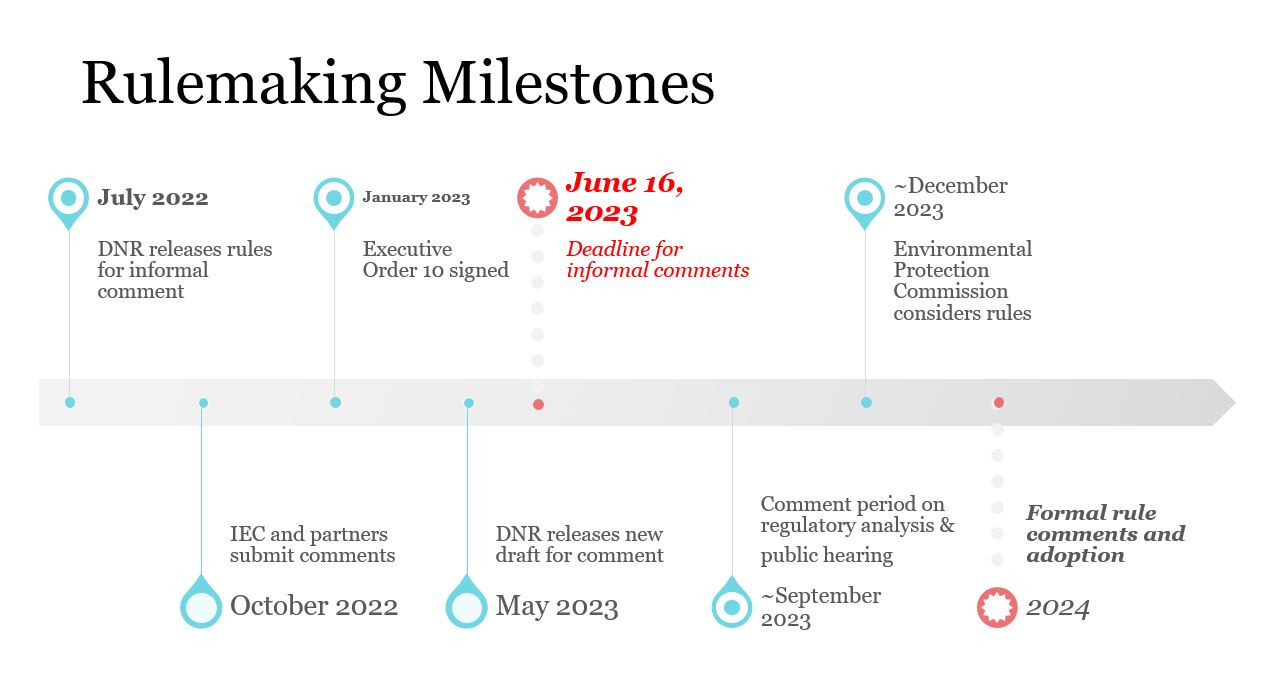Feedlot Rule Update: Round 2 of Many
posted
by Michael Schmidt on Friday, June 16, 2023
For thousands of years, humans have benefitted from the natural cycle of fertilizing crops with manure from their cow, goat, or other animals they raised. Today, however, we raise thousands of animals in a single operation, and makes for a lot of manure when you add up the thousands of operations spread across Iowa. When land-applied at this scale, it's not surprising to learn that that manure can run off or enter tile drains to reach creeks, rivers, and streams.
Strong rules and enforcement are the only protection we have from drinking and recreational waters polluted with fecal coliform, nitrate, and other contaminants. Despite the existing rules, we have hundreds of streams and many lakes, as well as private wells, teeming with high levels of fecal coliform and other pollutants.
 IEC has pushed DNR to protect from manure pollution for years, including protections for karst and drinking water, floodplains, and sensitive terrain in Northeast Iowa. We know that this pollution has serious consequences: the health effects of nitrate in drinking water include birth defects and cancer. Those risks are growing because of the rising nitrate concentrations in private wells and surface water.
IEC has pushed DNR to protect from manure pollution for years, including protections for karst and drinking water, floodplains, and sensitive terrain in Northeast Iowa. We know that this pollution has serious consequences: the health effects of nitrate in drinking water include birth defects and cancer. Those risks are growing because of the rising nitrate concentrations in private wells and surface water.
Iowa DNR is in the process of updating the rules defining how manure is stored at animal feeding operations, or AFOs, and then applied on the landscape. This AFO rulemaking is a chance for DNR to protect Iowans while saving them money, but we need stronger rules to make that happen. The draft rules have some changes, but not enough – and the process is more complicated thanks to an executive order.
What’s in the draft rules?
.png) Unfortunately, the draft rules still fail to protect karst terrain, where sinkholes and caves can short-circuit normal soil processes and make it easier for manure to reach surface or groundwater, or even lead to catastrophic failure of manure pits. The rules also allow manure management plans, which describe how manure will be applied to what plots of land, to be submitted on paper rather than electronically – making it nearly impossible to cross-check and assess whether the manure would be applied to fields that are already used in other plans.
Unfortunately, the draft rules still fail to protect karst terrain, where sinkholes and caves can short-circuit normal soil processes and make it easier for manure to reach surface or groundwater, or even lead to catastrophic failure of manure pits. The rules also allow manure management plans, which describe how manure will be applied to what plots of land, to be submitted on paper rather than electronically – making it nearly impossible to cross-check and assess whether the manure would be applied to fields that are already used in other plans.
We commented on these same issues last year, when DNR had an earlier draft of the rules. Rather than strengthen the karst rules, DNR has just rephrased the language and allowed a new type of clay-based liner below concrete pits. The proposed rules also fail to provide for monitoring around the facilities to provide warning when something goes wrong.
One positive change in the draft rules is the change in manure application rates. Too much manure leads to more runoff and pollution, so applying the right amount is critical. The rules would adopt the “maximum return to nitrogen,” which Iowa State University found would lead to a 9.8% reduction in nitrate in surface water. This is one of the single biggest steps to reduce nitrate pollution – and reduce the risk of cancer for Iowans across the state.
Executive Order Changes the Process
In a new twist, DNR has proposed to delete language from the rules in response to the governor’s Executive Order 10, signed in January 2023. The order requires agencies to conduct a “retrospective analysis” of their rules and to eliminate redundancy and reduce restrictive terms. Agencies have to repeal and re-adopt their rules within three years, justifying the rules they do adopt through a cost-benefit analysis. Any adopted rules must be no more stringent than the existing rules.
DNR is proposing to implement this by deleting definitions from the rules and pointing to four different statutory sections across multiple chapters of code where people can search for the deleted terms. This makes the rules harder to understand and the requirements less clear.
With the executive order, DNR anticipates at least two more public comment periods and a public hearing before final adoption of the rules.

IEC has worked with partners to submit detailed comments on behalf of a coalition of groups to request changes that will protect karst, require electronic manure management plans, and reduce excess manure application. Collectively, these changes would reduce water pollution across the state. Read more about the comments.
- cafos
- clean water
- dnr
- drinking water
- karst
- water quality